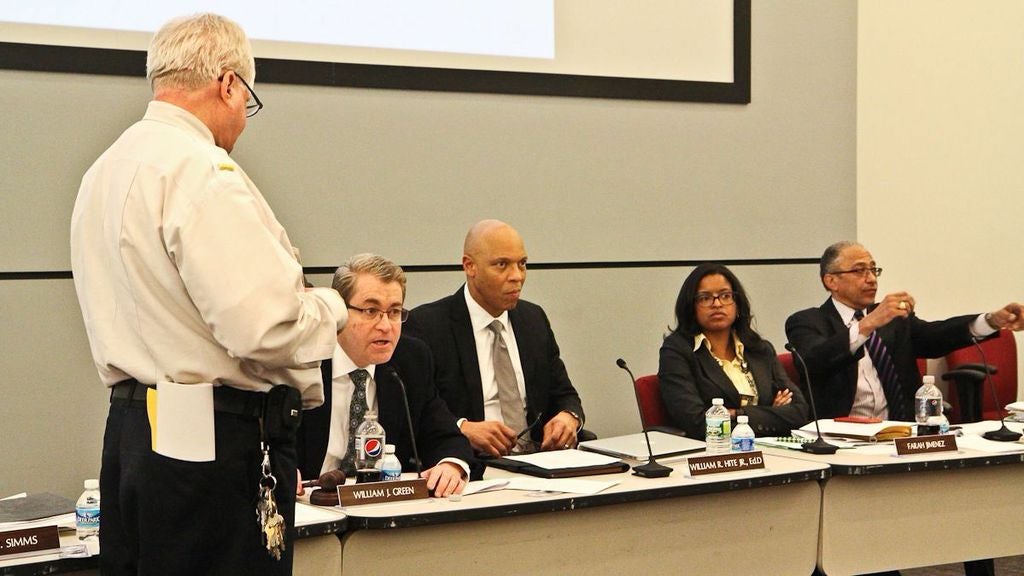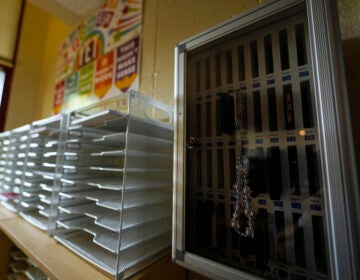Charter school providers turned down in Philly can make a case before state appeals board
Listen
Members of the School Reform Commission listen to testimony Wednesday from charter school applicants. Those who submitted the 34 proposals the SRC turned down have the option of appealing that decision to a state Charter Appeal Board. (Kimberly Paynter/WHYY)
Marc Mannella is a veteran of the Philadelphia education reform movement, but his education in the finer points of charter law may have only just begun.
“One way to look at tonight was that it was a night only lawyers could love,” said Mannella on Wednesday, after the School Reform Commission shot down two of his three proposed new charter schools.
As the head of KIPP Philadelphia, Mannella must now decide whether to turn those lawyers loose.
Until this year, the SRC had the final say on Philadelphia charters. But thanks to an amendment included in last summer’s cigarette tax bill, charter providers can now appeal the SRC’s decisions to the state’s Charter Appeal Board.
It’s that board that now has the final say over which charters open, and which ones close.
Mannella isn’t sure what KIPP will do. But the SRC’s decision left him both confused and disappointed. KIPP’s three applications were essentially identical, he said. But only one was accepted (with conditions), leaving him wondering exactly what criteria the SRC used to make its decisions.
“I’m not sure how one of three charters were approved for us when all three applications were the same, if they were truly voting on the merit of the charter,” he said.
The appeal process will give Mannella and other charter providers a chance to probe the district’s logic – and overturn it if they can.
Resolving an ‘inherent tension’
The seven-member Charter Appeal Board meets monthly in Harrisburg, hearing arguments from attorneys for districts and charters over every imaginable point of charter law – arguments which differ in details, but usually come down to the same basic conflict.
“The courts have acknowledged that there’s an inherent tension between school districts and charter schools, because the money from the district pays for the charter school,” said Brian Leinhauser, an attorney who’s been representing charters in front of the board for five years.
“That tension gets resolved through an appeal here.”
At this month’s meeting, for example, the board was asked to resolve six different disputes, ranging from a question over one school’s sectarian nature, to attempts by districts to hold back various schools’ expansion plans.
And while the board has ruled against charters on many occasions, this wasn’t the school districts’ lucky month. Charter schools in Pittsburgh and McKeesport won appeals against districts that didn’t want to let them open. Another in Lansdale won a new hearing.
And Leinhauser’s client, the Lehigh Valley Dual Language Charter School, successfully fended off an attempt by the Bethlehem Area School District to prevent it from expanding into a second location.
“The districts tend to oppose charter schools and their approval for a bunch of reasons,” Leinhauser said. “Sometimes the applications are just not good enough. Sometimes districts have concerns about finances and things like that. Other times, districts are just opposed to charter schools in general, and resist the competition.
“The law, in the 15 years that it’s been in place, has really grown, for good and for bad,” he said. School districts have learned to use the law to their advantage, he said, “just as I have.”
The appeal board’s six appointed members must include, by law, an academic, a charter school parent, a business owner, a member of a public school board, and representatives of the state Board of Education and the state teachers union. It’s chaired by the Secretary of Education, a position now filled by Gov. Tom Wolf’s nominee, Pedro Rivera. Other than the chairman, all six appeal board members were appointed by former Gov. Tom Corbett. Wolf will get to replace two when their terms expire in June.
Rivera, who chaired his first meeting this month, knows he has his work cut out for him. He said interpreting Pennsylvania’s charter law is anything but simple.
“It can be a very open-ended law; there are some aspects where the timeline is very specific, and there are other aspects of it where it is not specific at all,” said Rivera. “So I can’t say it’s a hard law, but it can be difficult to interpret.”
A limited mandate: Consider quality, not finances
Rivera says the board considers two basic issues in any appeal. One is whether the charter application meets the letter of the law. The second is the quality of the school itself.
What the board can’t consider, according to Rivera, is the financial impact a new charter might have on a district’s budget.
“The charter school law is very specific,” Rivera said. “You can’t make decisions for financial reasons. It has to be on the merit of the application.”
In Philadelphia, district officials feel they won’t have to worry about that when they defend their decisions. They say that every case was decided on academic merit, and that no charter was denied for financial reasons.
But charter school supporters are already questioning that assertion. Some, including Mannella, say they’re simply not sure of the SRC’s logic. Others, such as state Rep. Mike Turzai, say they think the SRC did consider financial and political factors, but just hasn’t acknowledged it.
“I think there were significant pressures put on them by the governor who wanted zero, who wanted zero approvals, and from the teachers union,” Turzai told WHYY’s Kevin McCorry. “I think there were significant pressures.”
Mannella says he’ll consult his board to see whether KIPP will dive into the appeal process. But if he does, Leinhauser says he’ll probably get a fair shake, as long as he makes a legally sound case that’s focused on what’s best for students.
“The reasonable choice is usually the choice they make,” he said. “Usually, I say — most often I get a reasonable decision out of them, whether I agree with it or not.”
WHYY is your source for fact-based, in-depth journalism and information. As a nonprofit organization, we rely on financial support from readers like you. Please give today.




